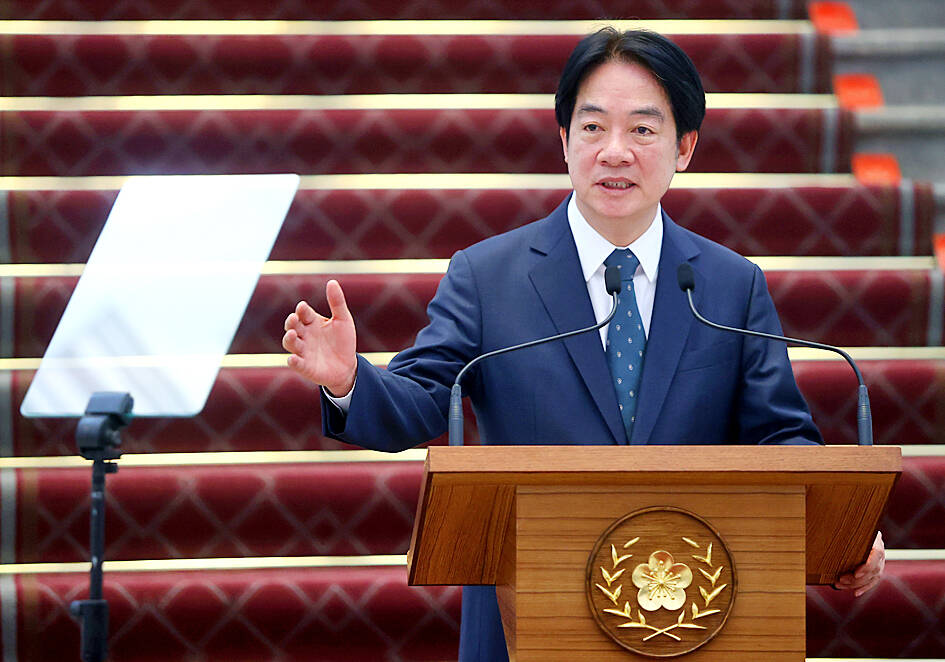Democracy is not a crime and autocracy is the real “evil,” President William Lai (賴清德) said yesterday after China threatened to impose the death penalty in extreme cases for “diehard” supporters of Taiwanese independence.
China has made no secret of its dislike of Lai, who took office last month, saying he is a “separatist,” and staged war games shortly after his inauguration.
On Friday, China ramped up its pressure on Taiwan by issuing new legal guidelines to punish those it says support the nation’s formal independence, although Chinese courts have no jurisdiction over the democratically governed nation.

Photo: CNA
Asked about China’s move at a news conference at the Presidential Office in Taipei, Lai first reiterated his sympathy for recent flooding in southern China before responding.
“I want to stress: Democracy is not a crime; it’s autocracy that is the real evil. China has absolutely no right to sanction Taiwan’s people just because of the positions they hold. What’s more, China has no right to go after Taiwan people’s rights across borders,” he said.
According to China, anyone who does not uphold “reunification” is a Taiwanese independence supporter, Lai added.
Relations between the two sides of the Taiwan Strait would become “more and more alienated” if China does not “face up to the existence of the Republic of China [Taiwan’s official name], and conduct exchanges and dialogue with Taiwan’s democratically elected and legitimate government,” Lai said.
“This is the correct way to enhance the well-being of people on both sides” of the Strait, he said.
Lai’s Democratic Progressive Party has long asserted Taiwanese sovereignty, and Beijing has not conducted top-level communications with Taipei since 2016, when former president Tsai Ing-wen (蔡英文) came to power.
The government said that since Thursday, there has been a sharp increase in Chinese military flights, as Beijing carried out a “joint combat readiness patrol” near the nation.
From Thursday to Sunday, Taiwan said it detected 115 Chinese military aircraft operating nearby, getting as close at 31 nautical miles (57 km) from Oluanpi (鵝鑾鼻), Taiwan proper’s southernmost tip.
Taipei has said that for the past four years China has carried out regular military activity around Taiwan as part of a “gray zone” pressure campaign.
Taiwan’s annual Han Kuang military exercises next month would aim to mimic actual combat as closely as possible given the rapidly rising “enemy threat” from China, a senior official said, speaking on condition of anonymity.
Additional reporting by AFP

DAREDEVIL: Honnold said it had always been a dream of his to climb Taipei 101, while a Netflix producer said the skyscraper was ‘a real icon of this country’ US climber Alex Honnold yesterday took on Taiwan’s tallest building, becoming the first person to scale Taipei 101 without a rope, harness or safety net. Hundreds of spectators gathered at the base of the 101-story skyscraper to watch Honnold, 40, embark on his daredevil feat, which was also broadcast live on Netflix. Dressed in a red T-shirt and yellow custom-made climbing shoes, Honnold swiftly moved up the southeast face of the glass and steel building. At one point, he stepped onto a platform midway up to wave down at fans and onlookers who were taking photos. People watching from inside

A Vietnamese migrant worker yesterday won NT$12 million (US$379,627) on a Lunar New Year scratch card in Kaohsiung as part of Taiwan Lottery Co’s (台灣彩券) “NT$12 Million Grand Fortune” (1200萬大吉利) game. The man was the first top-prize winner of the new game launched on Jan. 6 to mark the Lunar New Year. Three Vietnamese migrant workers visited a Taiwan Lottery shop on Xinyue Street in Kaohsiung’s Gangshan District (崗山), a store representative said. The player bought multiple tickets and, after winning nothing, held the final lottery ticket in one hand and rubbed the store’s statue of the Maitreya Buddha’s belly with the other,

Japan’s strategic alliance with the US would collapse if Tokyo were to turn away from a conflict in Taiwan, Japanese Prime Minister Sanae Takaichi said yesterday, but distanced herself from previous comments that suggested a possible military response in such an event. Takaichi expressed her latest views on a nationally broadcast TV program late on Monday, where an opposition party leader criticized her for igniting tensions with China with the earlier remarks. Ties between Japan and China have sunk to the worst level in years after Takaichi said in November that a hypothetical Chinese attack on Taiwan could bring about a Japanese

‘COMMITTED TO DETERRENCE’: Washington would stand by its allies, but it can only help as much as countries help themselves, Raymond Greene said The US is committed to deterrence in the first island chain, but it should not bear the burden alone, as “freedom is not free,” American Institute in Taiwan Director Raymond Greene said in a speech at the Institute for National Defense and Security Research’s “Strengthening Resilience: Defense as the Engine of Development” seminar in Taipei yesterday. In the speech, titled “Investing Together and a Secure and Prosperous Future,” Greene highlighted the contributions of US President Donald Trump’s administration to Taiwan’s defense efforts, including the establishment of supply chains for drones and autonomous systems, offers of security assistance and the expansion of